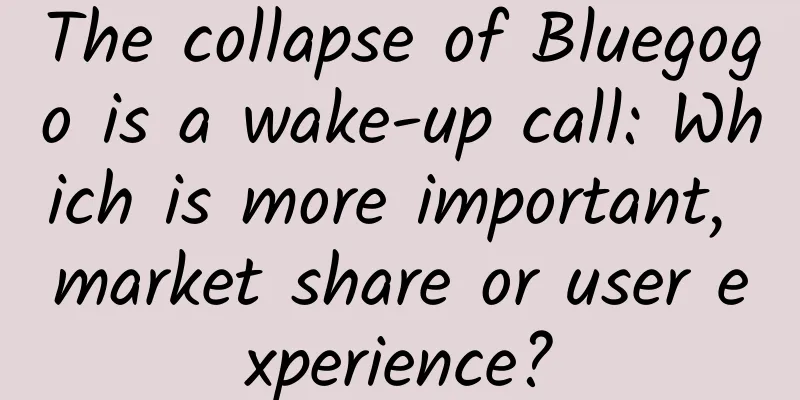The collapse of Bluegogo is a wake-up call: Which is more important, market share or user experience?

|
November 22 was supposed to be the first birthday of Bluegogo. But just a few days ago, Bluegogo’s problems escalated from difficulty in refunding deposits to layoffs and company closures. It also owed employees wages and suppliers money, just as Bluegogo founder Li Gang once said that “the fate of Bluegogo will be decided this winter.” A statement published on November 16 also officially announced the end of Bluegogo. On November 22 last year, Bluegogo, a bike-sharing platform owned by Beast Riding, officially launched in Shenzhen. In the following months, Bluegogo had 20 million registered users at its peak. In June this year, Bluegogo's financing failed, which led to a deterioration in its financial situation. As early as the end of September, Bluegogo was accused of having difficulty in refunding deposits. Until last week, Bluegogo's problems were imminent and it collapsed completely. On November 15 , Bluegogo, which had been in operation for less than a year, closed down. On the 16th, the CEO announced that it had reached a strategic cooperation with Bike Travel, and things had finally come to a head. But surprisingly, unlike Wukong Bike, 3Vbike, and Machi Machi Bike, Bluegogo received stronger positive feedback from users after its closure, with the most prominent word being “the best to ride.” These words are constantly emphasizing the user experience and reputation of Bluegogo, which is probably one of the factors that triggered the heated discussion about Bluegogo and made many people sigh. This is enough to make us think, why did Bluegogo, which is “very easy to ride,” fail to survive? The inevitability of the collapse of "Little Blues" Based on the articles on the Internet that lament or criticize Bluegogo, we can find that Bluegogo’s deposit refund problem is a major flaw, and its first-class user experience is also unquestionable. The current situation undoubtedly confirms one point: Bluegogo has a decisive shortcoming, and its closure is not accidental. First, it comes from the positioning deviation of Bluegogo. In an interview with Li Gang by China Entrepreneur at the end of March, it was learned that the Beast Riding Project focuses on serving cyclists and producing high-end bicycles. Bluegogo has obviously continued this "tradition". Its founder Li Gang introduced the entry of Beast Riding as a "cycling enthusiast" and "senior cyclist". Li Gang also made no secret of the high cost of Bluegogo in the interview. Even the cost of Bluegogo Pro with a gearbox is as high as 2,000 yuan. Bluegogo has positioned itself as the best user experience from the beginning. But Bluegogo has forgotten that the target of shared bicycles is not cyclists. In the craze of shared bicycles, the travel function attribute of bicycles is very prominent, that is, "having a bicycle to ride" is the basic condition, and the "riding" function is optional. In such a specific environment, the advantage of Bluegogo's "easy to ride" is basically gone. Secondly, they missed the best time to enter the market. In May this year, in the "2017 Q1 Domestic Shared Bicycle Market Research Report" issued by the Speedway Research Institute, Mobike ranked first with a market share of 56.56%, followed by ofo and Hellobike, and Bluegogo ranked fourth with a market share of only 2.71%. In another comparison table of basic elements of shared bicycle business, Bluegogo's equipment is basically the same as that of the leading company Mobike, and even lower than Mobike in terms of deposit and body weight. However, in the last item of the number of cities covered, the glaring number 7 in Bluegogo's column is in sharp contrast to Mobike's 130 and ofo's 150. In such a situation where shared bicycles are everywhere, market share is dwindling, and users have formed a certain stickiness, Bluegogo still rushes forward with a fairly optimistic attitude without hesitation, and the outcome is undoubtedly obvious. Finally, and most importantly, there is the problem of high costs and broken capital chains. Capital pressure is a common problem faced by all companies in this industry. Even ofo officially raised the deposit from 99 yuan to 199 yuan on June 20. The cost of making a car, the damage rate, the cost of operation and maintenance, the cost of promotion and operation, and even the subsidy war on users, none of them does not cost money. In such a context of capital shortage, shared bicycles are an industry with a very obvious head effect. After the initial pattern of the two giants competing for hegemony, capital began to calm down and moved closer to the head, and it was difficult for the second echelon to obtain financing. Although Bluegogo, which focuses on user experience, is praised by capital, it cannot get money and basically does not have the capital to compete with the two giants who "can't burn all the money". You should know that user experience is not the only factor that determines survival. In the context of emerging industries that prioritize reaching users and capital that values market share, Bluegogo, which focuses on user experience but not operations, has not mastered the secret of survival. It can be seen that if the market share is the same, the market share of products with better user experience will naturally increase, but it is the rapid development of shared bicycles that has destined that companies that do not seize the market first will not even have room to survive in the future. Seizing the market in the sharing boom is the top priority In fact, we all know that user experience and market share are equally important, but if we must find a balance, we must adapt to the times and the place. For companies like Bluegogo that are riding the wave of sharing, most of them have not yet reached the stage of "competing for strength". Occupying more market share and gaining first-mover advantage is the primary task of these start-ups. From the internal factors, the market share is indeed affected by user satisfaction. If the market share of competitors is evenly matched, then the internal user experience will directly determine who can play a bigger game. Users are the driving force for the subsequent development of enterprises. However, for the big wave of the sharing economy, its rapid development speed basically does not give any company a chance to breathe. Only those at the top of the pyramid have the opportunity, time and energy to innovate, transform and polish products. In other words, in the specific emerging industry of shared bicycles, most companies are far from having to compete on the hard power of user experience, and most companies have been "closed down" in the early stages. In terms of external factors, the factors affecting the market share of shared bicycles can basically be divided into two aspects. On the one hand, it is capital. Nowadays, Mobike and ofo have raised hundreds of millions of yuan in financing, and it is still unknown when this money-burning war will end. As long as there are competitors, the leading companies can use the overwhelming advantage of funds to defeat their competitors. After all, companies with profit as their ultimate goal will not extend the cost recovery line in vain. If it is "a loss" for the giants, someone will inevitably pay the price. From the collapse of Wukong and Xiaolan, we can see that, on the one hand, capital is calm, and on the other hand, the market of leading companies is squeezed, and the capital that can be allocated to latecomers is pitifully small. On the other hand, it is about resources. As we all know, Mobike and ofo each have their own sponsors. With the support of the giants' resources, the Matthew effect of the entire industry has been further deepened. First, the teaming of Alibaba and Tencent has won the most basic user trust for ofo and Mobike. Perhaps only with these two giants, users don't have to worry about not getting their deposits back; second, the two major traffic entrances of Alipay and WeChat are open to Mobike and ofo, and the platform resource advantages are obvious; third, the technical advantages of the giants, such as data, can directly empower and promote the iteration and upgrade of bicycles; fourth, the leading companies have entered a safe zone and have a benign ecological closed loop, while the latecomers have fallen into a vicious circle. In emerging Internet-related industries, market share is the primary condition for considering the survival of enterprises. After all, in an era when traffic is becoming increasingly scarce, reaching users is the prerequisite for all development. The difference between first-mover advantage and late-mover advantage Mobike and ofo entered the market at an astonishing speed, with traffic first and experience second. Bluegogo is also a typical example. For start-ups, user experience and market share are indeed a choice. User experience and market share are different factors that determine the period of advantage of a company. Under the wave of the sharing economy, with the development of the shared bicycle industry and the decline of Bluegogo, we have new thoughts on the balance between the two. For shared bike companies, market share is part of the experience: the volume of deployment determines whether users can use bikes anytime, anywhere. User experience is not limited to the riding experience. If we look at it from the perspective of bicycle travel, there are too many alternatives to Bluegogo, and Bluegogo lacks basic core competitiveness. The core competitiveness of Mobike and ofo comes from the market. They can use bikes anytime and anywhere, which is the power of a high market share. Once users are widely reached, traffic dividends such as capital, resources, and brand effects will follow. In this new industry with a threshold, retaining users is easier than attracting new users. For users, the first thing to do when facing this new industry is to be able to access the products, and then to compare and select. Whether it is Mobike, ofo, or hellobike, which has just begun to be widely introduced into the market, they all took advantage of their market share in the early stage and obtained financing. It is a wiser choice to survive first and then develop, win a wide market first, and then consider product polishing. Mobike and ofo are giants in first- and second-tier cities, while hellobike chooses to advance from third- and fourth-tier cities. This is undoubtedly a big move in a blank market. These are all examples of market first, experience later. As for capital, they don’t have the patience to wait for the polishing of fine products. Seeing profits is their goal. But now domestic start-ups are still facing the problem of capital shortage. The trend of capital concentration is also warning entrepreneurs of the importance of market share. As a result, more entrepreneurial projects will be abandoned, not because the products are not good enough, but because social resources are concentrated in the leading enterprises, leaving insufficient space for latecomers. After experiencing several major trends, capital has calmed down, which makes entrepreneurs see that entrepreneurship is not a matter of joy or sorrow, but a contest between life and death. In fact, the temporary competition between Mobike and ofo did not prevent more latecomers from surviving in the cracks, or even growing wildly. Mobike and ofo are just lucky ones selected by capital. Once the giants take sides, capital and resources will quickly gather. Mobike and ofo have grown up by competing in market share. In the tide of sharing, when companies have to choose between user experience and market share, they must survive in the early stage and grow in the later stage. It is a wise choice to seize the market first and then polish the product. Liu Kuang, uses Zen to comprehend the Internet, WeChat public account: liukuang110 As a winner of Toutiao's Qingyun Plan and Baijiahao's Bai+ Plan, the 2019 Baidu Digital Author of the Year, the Baijiahao's Most Popular Author in the Technology Field, the 2019 Sogou Technology and Culture Author, and the 2021 Baijiahao Quarterly Influential Creator, he has won many awards, including the 2013 Sohu Best Industry Media Person, the 2015 China New Media Entrepreneurship Competition Beijing Third Place, the 2015 Guangmang Experience Award, the 2015 China New Media Entrepreneurship Competition Finals Third Place, and the 2018 Baidu Dynamic Annual Powerful Celebrity. |
Recommend
The tableware you use every day, using it incorrectly is equivalent to chronic "poisoning"! Be careful of these 7 types of materials →
Tableware is something we come into contact with ...
Can mosquitoes spread the Wuhan coronavirus? Here is the most effective way to kill mosquitoes!
In a few days, the annoying mosquitoes will start...
Beware of being "pigeoned"! Beware of the hidden dangers of domestic pigeons!
Author: Ma Ruirui Liu Wenjing Peking Union Medica...
Learn something new! You can actually use the "flight mode" on your phone like this!
When it comes to the "Airplane Mode" on...
How to combat online music piracy? The key is not just about how many copyrights you buy
Since the rise of online music, Chinese people ha...
Insomnia, irritability, frequent headaches...People with these symptoms should pay attention!
Expert of this article: Wang Li, attending physic...
How can e-commerce companies operate Douyin private domain well?
With the rise of live streaming platforms and sho...
Thoughts and experience in Android development software architecture
1. Bud As a programmer with little programming ex...
After applying this sunscreen, remember to remove your makeup before going to bed...
Did you put on sunscreen when going out on May Da...
What do we do when we promote our app?
Abstract : I am quite familiar with this aspect, s...
How to find the lever to leverage traffic dividends?
The so-called traffic means acquiring new users. ...
3 tips to help operators write copy that attracts readers
Regarding copywriting , as an operator , I come i...
What! The oyster mushrooms and chicken leg mushrooms you usually eat actually "eat meat"?
In the eyes of many people, mushrooms are accusto...
China's automakers' exports grew 103% amid chip shortages, and will achieve independent automotive chip production in the future
Under the influence of the epidemic, global semic...
What are the ten rivers with the largest flow in the world?
There are many large rivers in the world, and the...









